Your basket is currently empty!
Written by
Boiler Not Firing Up? Main Failure Causes & How To Fix

Boiler not firing up? Here is our guide to reasons why and how to fix it
You’ve just arrived home on a cold winter evening, and you’re looking forward to getting into your warm home and taking a long bath. So, if you walk into a freezing cold house with no hot water, getting the boiler up and running as soon as possible will be your top priority.
Get fixed prices online in just 20 seconds – Click here
However, if you try to get your boiler working but it still does not fire up due to an ignition fault, we have some assistance and advice for you.

Fortunately, there are some boiler problems that you can check for, which could mean that the boiler is back up and running in no time.
If they don’t work, there are some really simple DIY solutions you can try before reaching for the hot water bottle!
If you do need to call an engineer, keep in mind that they must be a Gas Safe registered engineer in order to work on a gas appliance. They should service your boiler, such as Glow Worm boiler service, to see what the issue is with your boiler.
However, if your boiler is not working you should read this article.
Maybe get a new one if it’s on its way out – use this online tool
Get the best quotes for boiler installation online in under 1 minute now
New Gas Boilers with FREE Hive Mini Smart Thermostat!
£0 Deposit & 0% Interest Finance available
Fill in the form if you want a call back to book a service nationwide, or sign up for an annual service plan for £8.99
First things to check
As a result, it is not always the boiler that is the source of the problem. These are the first things to look into to see if you can get your home nice and warm quickly.
One common issue to check for is a boiler lockout, which can prevent the boiler from firing up.
Thermostat configuration

If your boiler thermostat is set to a low temperature, it’s possible that even though it feels cold, it’s not yet cold enough to turn on the heating. It’s very easy to knock the dial or accidentally lower the minimum temperature, so check that first.
Timer
The boiler timer should be checked next. Have you ever set the heating to come on later than you intended? Perhaps you changed it last week when you knew you’d be home later and then forgot to change it back.
If the timer is set to turn on when you get home, that will be the cause of the icy reception. Another cause of timer malfunctions is a power outage. This can cause the timing to become out of sync.
Gas supply
Is the gas supply operational? Try other gas appliances, such as a gas cooker, to see if they are working properly. If your gas appliances are limited to the boiler, check with a neighbour to see if their gas supply is working properly.
The gas pressure in your home can occasionally cause issues. If the gas pressure is low in the boiler, the flow may not be sufficient to ignite the boiler.
If there appears to be a problem with the gas supply, such as no supply or low gas pressure, you should contact your gas supplier or the Gas Emergency Service at 0800 111 999.
Additionally, if you suspect a gas leak, it is crucial to evacuate the area immediately and contact a Gas Safe registered engineer.
Get the best quotes for boiler installation online in under 1 minute now
New Gas Boilers with FREE Hive Mini Smart Thermostat!
£0 Deposit & 0% Interest Finance available
Carbon monoxide
While we’re talking about the gas supply, if your boiler is lighting, but there’s an orange or yellow pilot light, then it could be producing carbon monoxide. This is one of the harmful gases that can be fatal.
If the pilot light on your boiler is anything other than a crisp blue, you should turn the boiler off and call a gas engineer to come out and inspect it for you. Installing a carbon monoxide detector near your boiler can also help in early detection of harmful gases.
Electricity supply
Even a gas boiler needs some electricity to ignite. It doesn’t need much, but if there’s no power supply to your boiler, then it’s not going to turn on and that’s going to mean a lack of heating and hot water.
Fuse box
Next up is to check the fuse box. If there have been problems with the electricity supply then you might find that the fuse to the boiler needs resetting.
Prepayment gas meter
If you have a prepayment gas meter then do have a quick check to make sure that you have enough credit for the boiler to fire up.
Error codes
Although boilers are pretty straightforward there are a number of different problems that can occur. So most systems have a boiler display on which a fault code is shown. Then, when the boiler isn’t working in the way it should you’re provided with information on what the issue is.
Now, do bear in mind that each boiler brand uses different codes, so that means that Baxi boiler error codes for a pressure issue will be different from the error codes for Worcester Bosch boilers. There can also be some variations between the different models, even from the same manufacturer.
If you have your boiler handbook to hand that will list all the error codes along with their meaning. If you’re not sure where the handbook is, you’ll be able to download another copy from the website for your boiler brand.
Get the best quotes for boiler installation online in under 1 minute now
New Gas Boilers with FREE Hive Mini Smart Thermostat!
£0 Deposit & 0% Interest Finance available
Things to try
So, you’ve tried and checked all of our first lists, now we’re moving on to more simple diagnostic checks that might help you to get the heating system up and working.
Regular boiler service can help prevent many of these issues from occurring.
Resetting the boiler
If the electricity supply has gone off during the day, it can sometimes cause a boiler lockout situation. Not until the boiler is unlocked will it start to function properly.

This is another situation where you need to check the error code being displayed on the control panel. This will confirm that the boiler is locked out, and then your manual will give step by step instructions on how to unlock the boiler.
Check the pressure gauge
Your boiler needs a delicate balance of air and water for it to function correctly. The boiler pressure relates to the pressure of the hot water that’s flowing through your heating system.
The ideal pressure for your boiler is 1.5 bar but your system is likely to operate just fine with a pressure of between 1 and 2 bar. The pressure gauge on the front of the boiler will give you a reading of what the pressure is right now.
Low pressure
If there is low pressure then the boiler will fail to ignite. While high pressure, so anything over 2 bar, may result in a lockdown situation.
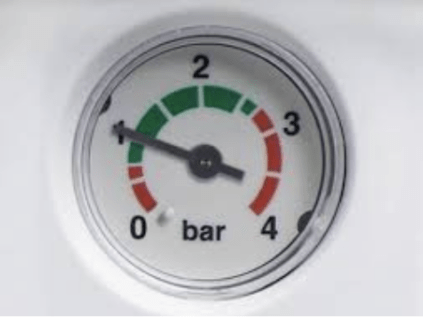
It is normal for boiler pressure to fluctuate a little and for it to decrease over time. But, if there is a sudden drop in pressure then that’s going to need further investigation by a heating engineer as it may be due to a fault with a pressure valve.
High pressure
If the boiler pressure is too high, then some of the radiators within your central heating system may need bleeding.
Bleed the radiators
To reduce the pressure in the heating system will need you to bleed all the radiators. This lets excess trapped air escape and rebalances the air and water in the system.
For this, you’re going to need the radiator key, a cloth, and a small container to collect any water that leaks out.
1. With cold radiators, place the cloth below the radiator bleed valve to catch any leaking water
2. Then use the key to open the valve, which in turn releases the air trapped in the radiator
3. Close the valve back up
4. Now recheck the water pressure meter on the front of the boiler
5. If you’re in the green then fingers crossed that the boiler will come to life.
Frozen condensate pipe
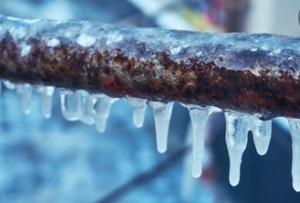
The condensate pipe travels from the boiler to an external drain to remove excess liquid from the boiler.
If there has been very cold weather then the wastewater can freeze causing frozen pipes and a blockage. Because the boiler can no longer get rid of the waste then it goes into lockdown.
This is another issue that’s easy to fix without needing the help of a boiler engineer. All you need to do is to pour warm water over the external condensate pipe to thaw the blockage and then reset your boiler.
Issues with the central heating system and boiler
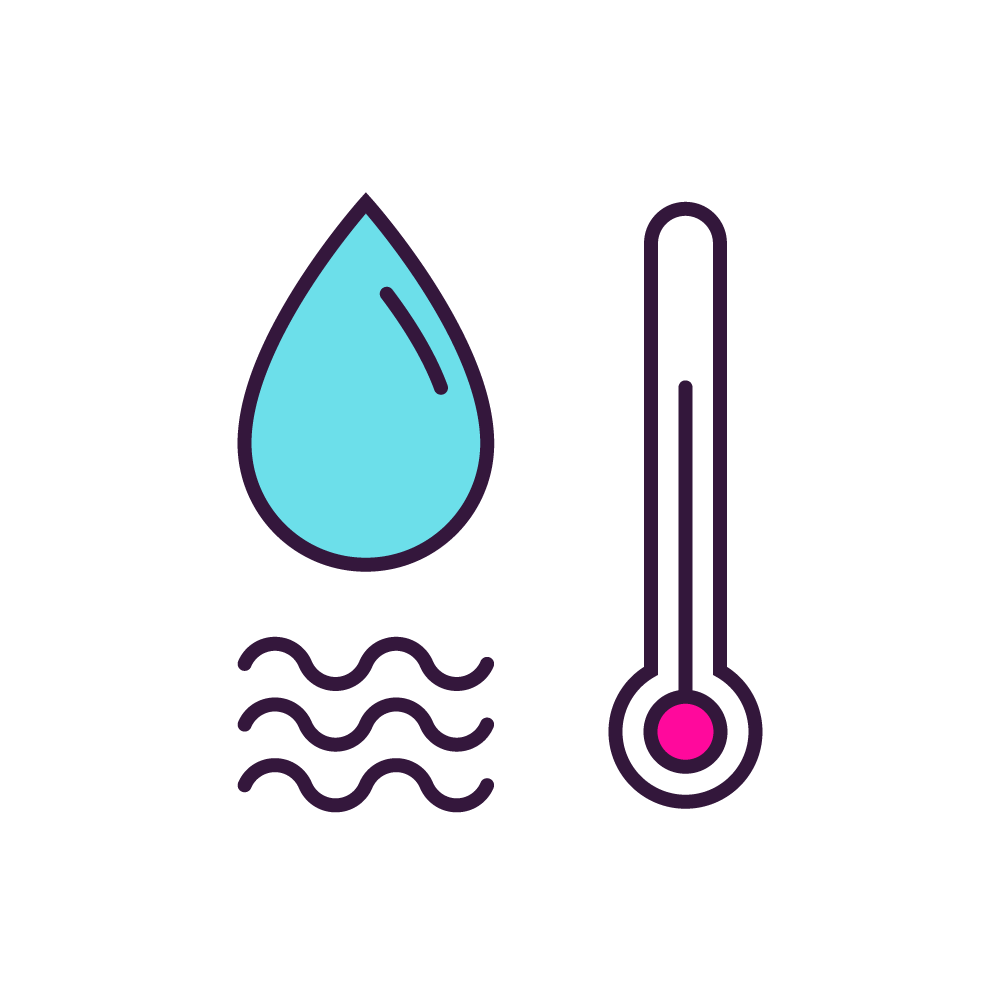
So you’ve done all the checks but you’re still having problems with the boiler not firing up meaning no central heating or hot water.
Now we get to the list of problems that are going to need the assistance of a gas-safe registered engineer. Do remember that UK legislation is in place to prevent anyone who is not a gas-safe engineer from removing the casing of a gas boiler.
Gas is a very safe energy source when it’s maintained by a professional and qualified engineer. If you have a relatively new boiler then you might still have warranty cover in place.
For older boilers, a boiler cover plan can be a great option to avoid big and unexpected repair bills. In some cases, a boiler repair may be necessary to resolve these issues.
No pilot light
The boiler pilot light is the flame inside of the boiler that catches with the gas which then enables the water to be heated. If there’s no pilot light then the boiler is not firing to then enable the heating process.
One of the common reasons for there being no pilot light is that the pilot light jet has become covered in debris. The blocked burner is then unable to light up.
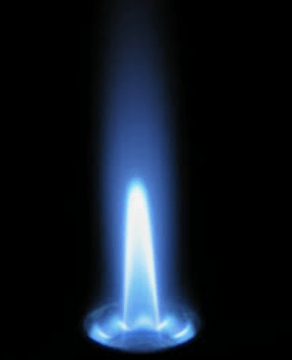
In older boilers, you can usually see the light of the flame through a small window in the boiler casing. On newer models, there will be an error code displayed to let you know that there’s a pilot light problem.
Burner replacements are a quick and easy job for your gas safe registered engineer to fix so you should have central heating and hot water back up and running in no time.
Faulty burner
When the burner is working it produces CO2 as waste gas. Over time this then causes the burner to become clogged up and develop mechanical faults. As a result, the burner might sometimes work and other times refuse to ignite, causing an ignition fault.
The burner within your boiler does age over time and with wear and tear replacing it might be the best option.
Low gas pressure
In some cases the supply of gas to the home is normal but the boiler is not firing because the gas valve is preventing enough gas from getting into the system.
When this happens, the boiler will go into lockout mode and then display a fault code. This is when you then need to get in touch with a gas-safe registered engineer who can test the pressure of the gas and work out why there’s not enough reaching the boiler.
Two causes of this problem are a gas meter that’s become frozen and a faulty gas valve.
1. Faulty gas valve
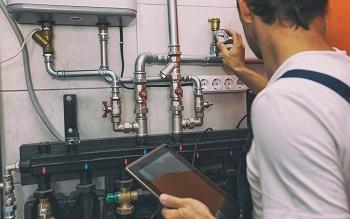
This is a more common cause of the problem as the gas valve controls the amount of gas that is able to flow into the boiler. It opens and closes which lets in more fuel or less depending on whether you need more heat or less.
The valve may have become damaged or blocked or it may just need adjusting to allow more gas to flow through. It’s also possible that a fault in the wiring to the valve can cause problems with it functioning correctly.
2. A frozen gas meter
If the weather has been very cold then it is possible that the gas meter becomes frozen. Ensuring that the meter is lagged will prevent any future issues.
Electrode and ignition lead faults
If you can hear clicking noises when your boiler is trying to ignite then it could be that it’s the electrode and ignition lead that could be causing the problem.
More often than not, gas-related issues result in intermittent operation, so the boiler ignites for a second and then goes off again. If it is a problem with the ignition lead and electrode, then the boiler won’t be able to ignite at all.
A heating engineer will be able to use a multimeter to check out the electrode and ignition lead and confirm if that’s the problem behind the lack of central heating and hot water.
Faulty thermocouple
The thermocouple is a safety device that turns off the gas supply when the pilot light goes off. Its heat sensor is connected to a solenoid and when the sensor is not heated by the boiler’s flame, then the solenoid closes the gas supply.
When a thermocouple becomes faulty, it prevents the flame from staying alight. Generally, a boiler thermocouple that has burned out or is no longer operating correctly, can be replaced relatively easily by a heating engineer.
When to Call a Professional
Signs that require expert intervention
While some boiler issues can be resolved with basic troubleshooting, others require the expertise of a qualified heating engineer. Here are some signs that indicate you need to call a professional:
- Persistent issues: If you’ve tried all the troubleshooting steps and the boiler is still not firing up, it’s time to call in an expert.
- Uncertainty: If you’re unsure about how to diagnose or repair the issue, it’s best to seek professional help to avoid causing further damage.
- Gas leaks: If you notice the smell of gas or suspect a gas leak, evacuate the area immediately and contact a Gas Safe registered engineer.
- Water damage: Signs of water damage or leaks around the boiler or pipes should be addressed by a professional to prevent further issues.
- Error codes: If the boiler’s display panel shows error codes or fault lights that you don’t understand, a professional can accurately diagnose and fix the problem.
- Pressure issues: Significant drops in boiler pressure or temperature can indicate underlying issues that require expert attention.
- Unusual noises: Strange noises or vibrations coming from the boiler can be a sign of mechanical problems that need professional intervention.
In these situations, it’s essential to call a Gas Safe registered engineer to diagnose and repair the issue. They have the necessary expertise and equipment to safely and efficiently resolve the problem, ensuring your boiler operates smoothly and safely.
Boiler lifespan
Although we have shown you the many ways to fix your boiler if it is not firing, sometimes your boiler may just be past its lifespan. If it has any of these issues then they can likely be fixed, but fixing these may just prolong the inevitable of having a broken boiler.
Most modern-day boilers last around 10-15 years, so if yours is around this age and continuously has issues, it may be time to get a new boiler.
Time for a new boiler?

When it feels as if you can no longer rely on your heating system, then the time may have come to start thinking about a new boiler installation. No longer will you need to dread the latest boiler repair bill or astronomic energy bills from your inefficient system.
Get fixed prices online in just 20 seconds – Click here
Getting a new boiler quote is a great way of seeing recommendations for systems to meet your heating needs. And with boiler installations available within a few days of placing the order, your home could soon be ready for whatever the British weather can throw at it!
Get the best quotes for boiler installation online in under 1 minute now
New Gas Boilers with FREE Hive Mini Smart Thermostat!
£0 Deposit & 0% Interest Finance available
Safety Precautions and Troubleshooting
Ensuring safety before repairs
Before diving into any troubleshooting or repair work on your boiler, it’s crucial to prioritize safety. Here are some essential safety precautions to take:
- Turn off the power: Always switch off the power to the boiler at the mains electrical supply to prevent any electrical hazards.
- Cool down the boiler: Ensure the boiler is cool before you start any work to avoid burns or other injuries.
- Wear protective gear: Don protective gloves and safety glasses to protect yourself from sharp edges and any debris that might fly off during repairs.
- Gas safety: If you smell gas or suspect a gas leak, evacuate the area immediately and contact a Gas Safe registered engineer. Never attempt to fix a gas leak on your own.
By following these safety steps, you can minimize risks and ensure a safer environment while working on your boiler.
Common troubleshooting steps
If your boiler is not firing up, there are several common troubleshooting steps you can take before calling in a professional:
- Check the power supply: Ensure that the boiler is plugged in and that the power switch is turned on. Sometimes, a simple power issue can be the culprit.
- Verify the gas supply: Make sure the gas supply to the boiler is turned on and functioning correctly. You can check other gas appliances in your home to see if they are working.
- Inspect the thermostat: Double-check that the thermostat is set to the desired temperature and is functioning properly. Sometimes, a misconfigured thermostat can prevent the boiler from firing up.
- Examine the pressure gauge: The boiler pressure should be within the recommended range, typically between 1 and 2 bar. If the pressure is too low or too high, it can prevent the boiler from operating correctly.
- Look for error codes: Check the boiler’s display panel for any error codes or fault lights. These can provide valuable clues about what might be wrong.
- Check for leaks: Inspect the area around the boiler and pipes for any signs of leaks or water damage. Leaks can cause significant issues and should be addressed promptly.
By following these troubleshooting steps, you might be able to identify and resolve the issue without needing professional assistance.
Get the best quotes for boiler installation online in under 1 minute now
New Gas Boilers with FREE Hive Mini Smart Thermostat!
£0 Deposit & 0% Interest Finance available
Written by
Get the best quotes for boiler installation online in under 1 minute now
New Gas Boilers with FREE Hive Mini Smart Thermostat!
£0 Deposit & 0% Interest Finance available





